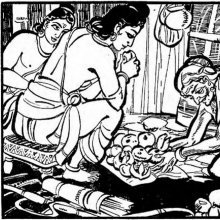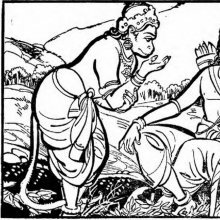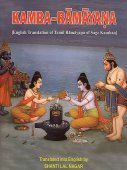Pampa, Pampā: 16 definitions
Introduction:
Pampa means something in Hinduism, Sanskrit, the history of ancient India, Hindi. If you want to know the exact meaning, history, etymology or English translation of this term then check out the descriptions on this page. Add your comment or reference to a book if you want to contribute to this summary article.
Alternative spellings of this word include Pump.
Images (photo gallery)
In Hinduism
Purana and Itihasa (epic history)
Source: archive.org: Puranic EncyclopediaPampā (पम्पा).—A pond near Ṛṣyamūkācala. Sugrīva used to stay near this pond. (Chapter 279, Vana Parva).
Source: archive.org: Shiva Purana - English TranslationPampā (पम्पा) is the name of a sacred river as mentioned in the Śivapurāṇa 1.12, “somehow men must strive to find a residence in a holy centre. On the shores of the ocean in the confluence of hundreds of rivers there are many such holy centres (puṇyakṣetra or tīrtha) and temples. [...] By residing on the banks of the auspicious rivers Sarasvatī, Pampā, Kanyā and Śvetanadī one shall attain Indraloka”.
Note: Pampā is a tributary of Tuṅgabhadrā river.
Source: Cologne Digital Sanskrit Dictionaries: The Purana Index1a) Pampā (पम्पा).—A river sacred to Hari; visited by Balarāma.*
- * Bhāgavata-purāṇa VII. 14. 31; X. 79. 12.
1b) A R. of the Bhadra country.*
- * Vāyu-purāṇa 43. 27.

The Purana (पुराण, purāṇas) refers to Sanskrit literature preserving ancient India’s vast cultural history, including historical legends, religious ceremonies, various arts and sciences. The eighteen mahapuranas total over 400,000 shlokas (metrical couplets) and date to at least several centuries BCE.
Kavya (poetry)
Source: Wisdom Library: KathāsaritsāgaraPampā (पम्पा) is the name of a lake (sara / saras) near the Ṛṣyamūka mountain, as mentionedin the Kathāsaritsāgara, chapter 107. Accordingly, “... and on the banks of the sanctifying Pampā lake near that mountain [Ṛṣyamūka] he [Naravāhanadatta] ate fruits and roots of heavenly flavour, and he drank the holy water of the lake, which was rendered delicious and fragrant by the fruits dropped from trees on its banks, as a relish to his meal of deer’s flesh”.
The Kathāsaritsāgara (‘ocean of streams of story’), mentioning Pampā, is a famous Sanskrit epic story revolving around prince Naravāhanadatta and his quest to become the emperor of the vidyādharas (celestial beings). The work is said to have been an adaptation of Guṇāḍhya’s Bṛhatkathā consisting of 100,000 verses, which in turn is part of a larger work containing 700,000 verses.

Kavya (काव्य, kavya) refers to Sanskrit poetry, a popular ancient Indian tradition of literature. There have been many Sanskrit poets over the ages, hailing from ancient India and beyond. This topic includes mahakavya, or ‘epic poetry’ and natya, or ‘dramatic poetry’.
India history and geography
Source: archive.org: Chaitanya’s life and teachings (history)Pampa is one of the places visited by Chaitanya during his pilgrimage in Southern India between April 1510 and January 1512.—Pampa.—The ancient and Puranic name of the Tungabhadra. The village of Hampi (the site of the famous capital Vijaynagar) was originally known as Pampa-tirtha. This name (also Pampa-saras) is now borne by a tank on the Haidarabad side of the Tungabhadra near Anegundi. (Bellary Gazetteer, 6, 261).

The history of India traces the identification of countries, villages, towns and other regions of India, as well as mythology, zoology, royal dynasties, rulers, tribes, local festivities and traditions and regional languages. Ancient India enjoyed religious freedom and encourages the path of Dharma, a concept common to Buddhism, Hinduism, and Jainism.
Languages of India and abroad
Sanskrit dictionary
Source: DDSA: The practical Sanskrit-English dictionaryPampā (पम्पा).—
1) Name of a lake in the Daṇḍakā forest; इदं च पम्पाभिधानं सरः (idaṃ ca pampābhidhānaṃ saraḥ) Uttararāmacarita 1; R.13.3; Bhaṭṭikāvya 6.73.
2) Name of a river in the south of India.
Source: Cologne Digital Sanskrit Dictionaries: Shabda-Sagara Sanskrit-English DictionaryPampā (पम्पा).—f.
(-mpā) 1. The name of a river, in the south of India. 2. Name of a lake in the Dandaka forest. E. pā to drink, pa Unadi aff., man inserted, and the radical vowel made short.
--- OR ---
Pāmpa (पाम्प).—mfn.
(-mpaḥ-mpī-mpaṃ) Belonging to the river, (Pampa.) E. pampā, and aṇ aff.
Source: Cologne Digital Sanskrit Dictionaries: Benfey Sanskrit-English DictionaryPampā (पम्पा).—f. The name of a river.
Source: Cologne Digital Sanskrit Dictionaries: Cappeller Sanskrit-English DictionaryPampā (पम्पा).—[feminine] [Name] of a river and a lake.
Source: Cologne Digital Sanskrit Dictionaries: Monier-Williams Sanskrit-English Dictionary1) Pampā (पम्पा):—f. (√1. pā? [Uṇādi-sūtra iii, 28. [Scholiast or Commentator]]) Name of a river in the south of India, [Mahābhārata; Rāmāyaṇa] etc.
2) of a lake, [Raghuvaṃśa [Scholiast or Commentator]]
3) Pāmpa (पाम्प):—mf(ī)n. belonging to or situated on the river Pampā, [Bhaṭṭi-kāvya] (also pana, [Monier-Williams’ Sanskrit-English Dictionary]).
Source: Cologne Digital Sanskrit Dictionaries: Yates Sanskrit-English Dictionary1) Pampā (पम्पा):—(mpā) 1. f. River in Orissa.
2) Pāmpa (पाम्प):—[(mpaḥ-mpī-mpaṃ) a.] Of or belonging to the Pampā river.
[Sanskrit to German]
Sanskrit, also spelled संस्कृतम् (saṃskṛtam), is an ancient language of India commonly seen as the grandmother of the Indo-European language family (even English!). Closely allied with Prakrit and Pali, Sanskrit is more exhaustive in both grammar and terms and has the most extensive collection of literature in the world, greatly surpassing its sister-languages Greek and Latin.
Hindi dictionary
Source: DDSA: A practical Hindi-English dictionaryPaṃpa (पंप) [Also spelled pump]:—(nm) a pump; a kind of shoe.
...
Kannada-English dictionary
Source: Alar: Kannada-English corpusPaṃpa (ಪಂಪ):—[noun] one of the two equal parts of a whole; a half portion.
--- OR ---
Paṃpa (ಪಂಪ):—[noun] the first major Kannaḍa poet who lived in 10th century B.C. and wrote Ādi Purāṇa and Vikramārjuna Vijaya.
Kannada is a Dravidian language (as opposed to the Indo-European language family) mainly spoken in the southwestern region of India.
Nepali dictionary
Source: unoes: Nepali-English DictionaryPampa (पम्प):—n. pump;
Nepali is the primary language of the Nepalese people counting almost 20 million native speakers. The country of Nepal is situated in the Himalaya mountain range to the north of India.
See also (Relevant definitions)
Starts with (+20): Pampa-seta, Pampaikkaran, Pampaittalai, Pampaiyati, Pampaka, Pampal, Pampala, Pampali, Pampalienaram, Pampalimacu, Pampalimas, Pampamahatmya, Pampamca, Pampanai, Pampanga, Pampantra, Pamparaikkariyam, Pamparakkumpil, Pamparam, Pamparamasam.
Ends with: Svarapampa.
Full-text (+21): Pampamahatmya, Andean pampas grass, Pampas grass, Pink pampas grass, Purple pampas grass, Selloa pampas grass, Nagacandra, Rishyamuka, Petrola, Pampa-seta, Pampavetti, Pump, Pampaka, Tadakin, Petrol, Shubhadarsha, Shubhadarshana, Adikavya, Adyakavya, Pushkarini.
Relevant text
Search found 23 books and stories containing Pampa, Pampā, Pāmpa, Paṃpa; (plurals include: Pampas, Pampās, Pāmpas, Paṃpas). You can also click to the full overview containing English textual excerpts. Below are direct links for the most relevant articles:
Garga Samhita (English) (by Danavir Goswami)
Verse 8.13.62 < [Chapter 13 - A Thousand Names of Lord Balarāma]
Chaitanya Bhagavata (by Bhumipati Dāsa)
Verse 1.9.129 < [Chapter 9 - Nityānanda’s Childhood Pastimes and Travels to Holy Places]
Ramayana of Valmiki (by Hari Prasad Shastri)
Chapter 75 - Rama reaches the Lake Pampa < [Book 3 - Aranya-kanda]
Chapter 1 - Rama describes the Spring and the Sentiments it evokes in him < [Book 4 - Kishkindha-kanda]
Chapter 73 - Kabandha’s Counsel to Rama < [Book 3 - Aranya-kanda]
Puranic encyclopaedia (by Vettam Mani)
Reviews < [January 1969]
What does the Kirtimukha mean? < [Aug - Sept 1939]
Sarvajna of Karnataka - The Peoples Poet < [May-June, 1929]
Ramayana (by Manmatha Nath Dutt)
Related products




